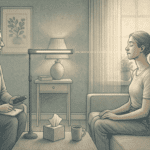Depression Treatment
Mission Connection Healthcare adopts a holistic approach to depression treatment, believing that addressing depression involves more than just managing symptoms; it’s about fostering lasting emotional and mental well-being. Our online depression treatment services aim to help you regain control of your life, find hope, and reconnect with your inner strength.

Key Takeaways
- Depression treatment includes psychotherapy, medications, and personalized care plans.
- Effective evidence‑based therapies like CBT help change unhelpful thoughts and behaviors.
- Treatment may involve a combination of approaches tailored to each individual’s needs.
- Outpatient programs allow flexible care while maintaining daily routines.
- Mission Connection offers compassionate support and guidance from trained mental health professionals.
Table of Contents
Recognizing the Signs of Depression
Recognizing the signs of depression in yourself or others is crucial for seeking help and support when needed, as depression is a complex and often misunderstood mental health condition that can affect anyone, regardless of age, gender, or background. Taking note of these signs marks the first step towards effectively managing depression. Here are some common signs and symptoms to be aware of:
Depression can lead to changes in appetite, resulting in significant weight loss or gain. Some may lose interest in eating, while others may use food as a coping mechanism.
Depression can impair cognitive function, making it difficult to concentrate, make decisions, or remember things. This can impact work, school, and daily responsibilities.
People with depression often have a pervasive sense of worthlessness and guilt, even if there is no rational reason for it. They may constantly blame themselves for things beyond their control.
Some individuals with depression may become easily irritable or agitated, expressing their emotional pain through anger or frustration.
Types of Depression
- Major Depressive Disorder (MDD): This common type involves persistent and severe depressive symptoms that disrupt daily functioning.
- Persistent Depressive Disorder (Dysthymia): This chronic form lasts for at least two years (or one year in children and adolescents).
- Bipolar Disorder (Manic Depression): This entails extreme mood swings between depressive and manic or hypomanic episodes.
- Seasonal Affective Disorder (SAD): SAD occurs seasonally, typically during fall and winter when there’s less natural sunlight.
- Psychotic Depression: This type involves severe depressive symptoms alongside psychotic features like hallucinations or delusions.
- Postpartum Depression: Occurring in some women after childbirth, it resembles MDD but emerges within weeks to a year postpartum.
- Premenstrual Dysphoric Disorder (PMDD): PMDD leads to significant mood disturbances before menstruation.
- Atypical Depression: Atypical depression involves symptoms such as oversleeping, overeating, and mood reactivity.
- Situational or Reactive Depression: This type arises in response to specific life events or stressors, improving as the situation resolves.

The Benefits of Depression
At Mission Connection Healthcare, we commit to providing you with comprehensive, compassionate, and effective depression treatment that can lead to positive changes in your life. We understand the debilitating impact of depression and the importance of seeking help.
Personalized Care
We recognize that each person's experience with depression is unique. Our depression treatment team tailors your care to your specific needs.
Caring Professionals
Our team of licensed and experienced mental health professionals is dedicated to your well-being.
Evidence-Based Therapies
We base our approach to depression treatment on evidence-based therapies, including cognitive-behavioral therapy (CBT), dialectical behavior therapy (DBT), and mindfulness-based techniques.
Convenient Online Services
We understand that seeking help for depression can be challenging due to busy schedules and other commitments.
What to Expect from Our Depression Treatment
Comprehensive Assessment
We begin by conducting a thorough assessment to understand your specific symptoms, triggers, and underlying factors contributing to your depression.
Tailored Treatment
Based on your assessment, we develop a customized treatment plan that may include individual therapy sessions, group therapy, medication management, or a combination of approaches.
Regular Check-Ins
We offer regular check-in sessions to track your progress, adjust your treatment plan as needed, and provide ongoing support.
Skill-Building
We equip you with coping strategies and practical skills to manage your depression and develop resilience.
Long-Term Wellness
Our goal is not just short-term relief but long-term wellness. We empower you to build a foundation for a brighter future.
Frequently Asked Questions
Consult a mental health professional for a proper evaluation if you experience persistent feelings of sadness, hopelessness, and a loss of interest or pleasure in daily activities, which characterize depression.
Our personalized approach ensures that we address your specific needs by providing treatment for various types of depression, including Major Depressive Disorder (MDD), Persistent Depressive Disorder (Dysthymia), Bipolar Disorder, Seasonal Affective Disorder (SAD), and others.
We offer flexible scheduling to accommodate your needs, allowing you to typically have sessions with a licensed therapist via secure video conferencing, phone calls, or chat. This enables you to receive therapy and support from the comfort of your home through our online depression treatment services.
Yes, numerous studies have demonstrated that online therapy can be as effective as in-person therapy for many individuals. Our therapists are highly trained and experienced in delivering remote mental health services to ensure you receive the care you need.
Certainly, our therapists possess specialized training and extensive experience in treating anxiety disorders and providing mental health treatment.
The duration of treatment varies from person to person and depends on the severity of your depression. Treatment typically involves regular therapy sessions, and you can expect to work collaboratively with your therapist to develop coping strategies, gain insights, and make progress towards improved mental health.
Our team includes licensed professionals who can provide medication management as part of your treatment plan if it is deemed necessary. Medication may be recommended in conjunction with therapy for some individuals.
Yes, we take your privacy seriously. We treat all your personal and medical information with the utmost confidentiality and comply with relevant privacy laws and regulations.
We can help verify your insurance benefits and guide you through the billing process, as many insurance plans provide coverage for mental health services, including depression treatment.
To get started, simply reach out to us through our contact page or by phone. We will schedule an initial consultation to assess your needs and determine the best course of action for your treatment.
Get Started
Start Your Journey to Healing Today
Take the first step towards healing. Contact us today to schedule a consultation, and let us be your partner in the journey to mental and emotional well-being.
- Signs of Treatment-Resistant Depression
- Signs of Depression Relapse
- Depression-Related Sleep Issues
- Depression Symptom Checklist
- ICD-10 Criteria for Depression
- Major Depressive Disorder (MDD) Symptoms
- Depression Symptoms
- Depression Self-Test
- PHQ-9 Depression Test
- Warning Signs of Depression
- Types of Depression
- Best Therapies for Depression
- Talk Therapy for Depression
- Telehealth for Depression
- Personalized Therapy for Depression
- Holistic Treatment for Depression
- Online Therapy for Depression
- Effective Treatments for Depression
- Medications for Depression
- Treatment-Resistant Depression Options
- Depression Relapse Prevention





